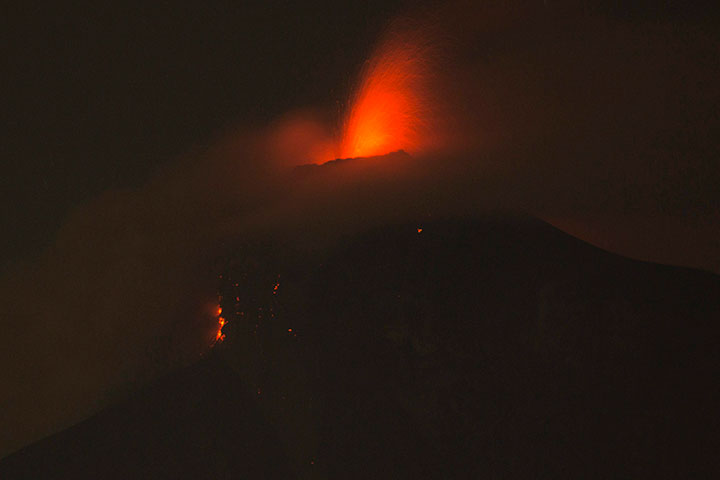Rescuers pulled survivors and bodies Monday from the charred aftermath of the powerful eruption of Guatemala’s Volcano of Fire, as the death toll rose to 62 and was expected to go higher from a disaster that caught residents of remote mountain hamlets off guard, with little or no time to flee to safety.

Using shovels and backhoes, emergency workers dug through the debris and mud, perilous labour on smouldering terrain still hot enough to melt shoe soles a day after the volcano exploded in a hail of ash, smoke and molten rock.
READ MORE: Hiker captures moment Guatemala volcano erupts, spewing thick ash
Bodies were so thickly coated with ash that they looked like statues, and rescuers were forced to use sledgehammers to break through the roofs of houses buried in debris up to their rooflines to try to see if anyone was trapped inside.
Fanuel Garcia, director of the National Institute of Forensic Sciences, said 62 bodies had been recovered and 13 of those had been identified.
“It is very difficult for us to identify them because some of the dead lost their features or their fingerprints” from the red-hot flows, Garcia said. “We are going to have to resort to other methods … and if possible take DNA samples to identify them.”
Hilda Lopez said her mother and sister were still missing after the slurry of hot gas, ash and rock roared into her village of San Miguel Los Lotes, just below the mountain’s flanks.
“We were at a party, celebrating the birth of a baby, when one of the neighbours shouted at us to come out and see the lava that was coming,” the distraught woman said. “We didn’t believe it, and when we went out the hot mud was already coming down the street.”
“My mother was stuck there, she couldn’t get out,” said Lopez, weeping and holding her face in her hands.
Her husband, Joel Gonzalez, said his father had also been unable to escape and was believed to be “buried back there, at the house.”
- Enter at your own risk: New home security camera aims paintballs at intruders
- Boston Dynamics unveils ‘creepy’ new fully electric humanoid robot
- Ontario First Nation calls for chemical plant to be shut down amid ‘dangerously high’ benzene levels
- Nova Scotia scraps spring bear hunt idea, public ‘very divided’ on issue
Guatemalan authorities say they had been closely monitoring the Volcano of Fire, one of Central America’s most active, after activity picked up around 6 a.m. Sunday.
In this image taken with a long exposure, the Volcan de Fuego, or Volcano of Fire, spews molten rock from its crater in Alotenango, Guatemala, Sunday, June 3, 2018.The volcano has registered a number of minor eruptions over the years, and no evacuations were ordered as scientific experts reported the activity was decreasing.
Guatemala’s disaster agency, Conred, issued a number of standard precautions, advising people to wear protective face masks, clean their rooftops of ash once the eruption was over and cover any food and water intended for human consumption. It also said to heed any recommendations from authorities. Guatemala City’s international airport was closed due to the danger to planes.
Conred spokesman David de Leon said that around 2 p.m. the volcano registered a new, more powerful explosion.
Soon, searing flows of lava, ash and rock mixed with water and debris were gushing down the volcano’s flanks, blocking roads and burning homes.
“It travelled much faster. It arrived in communities right when the evacuation alerts were being sent out,” de Leon said.
WATCH: Guatemala volcano death toll rises, more feared dead

Authorities scrambled to issue an evacuation order. Some communities emptied out safely. But in places like Los Lotes and the village of El Rodeo, about eight miles (12 kilometres) downslope from the crater, it was too late for many.
The fast-moving flows overtook people in homes and streets with temperatures reaching as high as 1,300 degrees Fahrenheit (700 Celsius), and hot ash and volcanic gases that can cause rapid asphyxiation.
Rafael Letran, a resident of El Rodeo, criticized Conred for not evacuating communities earlier.
“When the lava was already here they passed by in their pickup trucks yelling at us to leave, but the cars did not stop to pick up the people,” Letran said. “The government is good at stealing, but when it comes to helping people they lack spark.”
De Leon said the disaster agency followed protocol.
Firefighters pray after Fuego volcano erupted violently in San Juan Alotenango, Guatemala June 3, 2018.”As soon as we received the information around 6 a.m. that the volcano was in an eruptive phase, the protocol was initiated to verify with different sectors and also talk to the communities, to community leaders. … We had the information from our scientific service, and they told us the trend was that the activity was diminishing,” he said.
WATCH: A volcano southwest of Guatemala’s capital has erupted for the second time this year

In El Rodeo on Monday, heavily armed soldiers wearing blue masks to avoid breathing in ash stood guard behind yellow tape cordoning off the disaster scene. Helmeted workers carried bodies away on stretchers, and smoke was still rising from some parts of the ashen landscape strewn with boulders and other debris.
President Jimmy Morales travelled to survey the disaster area.
Emergency crews in helicopters managed to pull at least 10 people alive from areas cut off by the flows. Conred said 3,265 people had been evacuated.









Comments